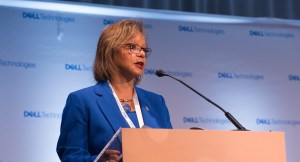There’s a gap in education that only industry can fill, report says

High schools are teaching students a curriculum that prepares them for a future that doesn’t exist, according to a recent report from an education nonprofit.
According to the America Achieves Educator Networks, or AAEN — an initiative of the nonprofit accelerator America Achieves, which supports best practices and policy research among K-12 and higher education — if schools can’t understand the future of work, then they need to turn students’ attention to the employers and industry leaders who do.
“Our schools need help from stakeholders who have a better understanding of how well-paid, upwardly mobile careers are changing, the related skills and knowledge expected of new hires, and how best to develop and assess these skills,” the report says.
The group argues that traditional K-12 curriculums aren’t sufficient for a world in which machines are expected to do 42 percent of labor by 2022. Schools must enlist industry partners, it says, to teach marketable skills to students. It’s a similar sentiment to what was advocated by the federal government in its latest STEM strategy plan authored by the White House’s Office of Science and Technology Policy and the National Science and Technology Council, which advises institutions to create an “ecosystem” of public-private partnerships in the sciences, with the idea of creating a pipeline into nascent industries.
The AAEN report, released in December, encourages a similar process, but with a focus on creating pathways into private industry. The report encourages school leaders to ensure their students are both “college and career” ready by describing: the importance of employer engagement in schools for students, the benefits and challenges of establishing partnerships, the variety of partnerships, practical advice, and a catalog of resources.
According to a nonprofit called Achieve, 62 percent of employers say that high schools aren’t adequately preparing students for college and career success. Engaging students with industry or company-based opportunities, however, can introduce them to the skills that they will need to actually develop a career in their chosen field.
The report makes a point of warning school leaders that they must develop these relationships with employers carefully, however, lest the management of such a program become a burden to school leaders. To efficiently run an industry partnership, sufficient staffing and planning must be a prerequisite, the report says.
“The interests of employers and schools have to be carefully balanced. Their respective constraints and cultures need to be considered,” the report says.




